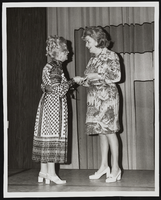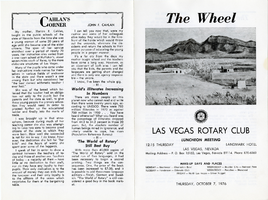Search the Special Collections and Archives Portal
Search Results
Thalia Dondero Political Papers
Identifier
Abstract
The Thalia Dondero Political Papers (1934-2003), contain correspondence, pamphlets and reports used by Dondero to conduct official business, as well as information on county and city budgets, social and health services, liquor and gaming, planning, public works, environmental impact reports and a large section on water management. Dondero served as a Clark County Commissioner for twenty years and engaged in numerous other civic and political activities. The bulk of the materials are derived from Dondero's last four years in office, 1990-1994, but a few items from Dondero's earlier career are included.
Archival Collection
Audio clip from interview with Courtney Hunt by Claytee D. White, October 2, 2013
Date
Archival Collection
Description
In this clip, Mr. Hunt, also known as "Nutt," explains how the CONVICTS motorcycle club was named, the acronymn meaning and overview of membership community activities.
Sound

Biographical essay by Eva Peters, 2014
Date
Archival Collection
Description
Peters' essay describes her family's journey to escape the Nazis and Communism, remaining in Hungary until 1956. She and her husband were part of the Hungarian Freedom Fighters group, and escaped to Vienna, and then to the U.S.
Text
Audio clip from interview with Jerry Fox, November 12, 2014
Date
Archival Collection
Description
Part of an interview with Jerry Fox on November 12, 2014. In this clip, Fox talks about arriving in Las Vegas in 1955, and how his father came to own a delicatessen on the Las Vegas strip.
Sound

Fedora Bontempi with Eleanor Grasso: photographic print
Date
Archival Collection
Description
Image
Evelyn Stuckey Papers
Identifier
Abstract
The Evelyn Stuckey Papers date from 1940 to 1972 and document Stuckey's experience as a physical education teacher at Las Vegas High School (LVHS) in Las Vegas, Nevada and founder of the LVHS Rhythmettes dance group. The collection contains personal and educational materials from Stuckey’s college years, personal correspondence, and photographs. It also contains materials documenting the Rhythmettes' activities including travel plans, posters and fliers, news clippings, and group rosters.
Archival Collection

Transcript of interview with Evelyn Miller McDonald by Maylene C. Cabatingan, February 26 & 27, 1980
Date
Archival Collection
Description
On February 26, and 27, 1980, Maylene C. Cabatingan interviewed Evelyn Miller McDonald (born 1905 in Alderson, West Virginia) about her life in Las Vegas, Nevada. Also present during the interview is Maylene’s step-father (name unknown) who occasionally participates in the conversation. At the time of the interview, McDonald had lived in Nevada for over seventy-two years and described early Las Vegas as a small-town railroad community with few amenities. McDonald discusses her occupational history, and how her father started the first car garage in Las Vegas. She goes on to talk about the impact of the Great Depression on Las Vegas and how Hoover Dam’s construction reduced the severity of the financial depression in comparison to other cities. She then recites the hotels that were built and the appeal that Vegas had to tourists and divorcees. McDonald later discusses how prostitution was accepted by the community, and recalls a story about how local businessmen rallied together to ensure that a minister would preach the funeral for a young woman who had died, despite being a prostitute. McDonald concludes her interview with a brief discussion of her goals in life and her pride in her daughters.
Text


The Wheel Las Vegas Rotary Club newsletter, October 7, 1976
Date
Archival Collection
Description
Text
Audio recording clip of interview with Monroe Williams by Claytee D. White, August 15, 2000
Date
Archival Collection
Description
Part of an interview with Monroe Williams conducted by Claytee D. White on August 15, 2000. Williams describes his experience in the fire department.
Sound
